
The Project Gutenberg EBook of The World Turned Upside Down, by E. C. Clayton This eBook is for the use of anyone anywhere at no cost and with almost no restrictions whatsoever. You may copy it, give it away or re-use it under the terms of the Project Gutenberg License included with this eBook or online at www.gutenberg.org Title: The World Turned Upside Down Author: E. C. Clayton Release Date: September 13, 2011 [EBook #37414] Language: English Character set encoding: ISO-8859-1 *** START OF THIS PROJECT GUTENBERG EBOOK THE WORLD TURNED UPSIDE DOWN *** Produced by Emmy, Marilynda Fraser-Cunliffe and the Online Distributed Proofreading Team at https://www.pgdp.net (This file was produced from images generously made available by the University of Florida Digital Collections.)

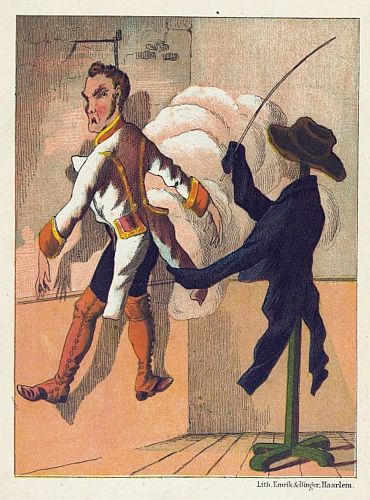

"To be beaten, and caned, and cuffed, and shaken, two or three times a-day," cried he, whisking his tails about like an angry lion, "I say it's a shame."
"If you were not well thrashed," said the Cane, "you'd soon get thick with dust, and then I'd like to know how you'd look."
"So I say," remarked the Hat.
"It's all very well for you to talk, Mr. Cane," said the Coat, still more in a rage. "Nobody ever hits you, and if they did, you could hit back. And as for you, Mr. Hat, nobody ever thinks of punching you, except in fun. You have a nice soft brush all to yourself."
"Well, are you not brushed as well?" asked the Hat.
"I don't mind being brushed," said the Coat, "but the next time Mr. Valet comes along, and hits me, I'll—I'll—" then he growled something to himself, whisked his tails, and added, "See if I don't."
In came the Valet, and bustled about. The Coat eyed him, and when he came close, caught him up with such a clutch.
"Hallo, hallo, hallo!" cried the Valet. "What are you doing?"
But the Coat hung the Valet on a nail, and snatched up the Cane.
"Now, look here, Mister Valet," said he. "I'm not going to be dusted and beaten and thumped. I'm just going to show you what it feels like, Mister Valet."
"What are you talking about, you stupid old Coat?" said the Valet.
"I'll let you see," said the Coat, flourishing the Cane.
The Cane could not help himself, for he was thin.
Thump, thump, thump, went the Coat, blowing out such clouds and clouds of dust from the Valet's clothes, never remembering he was covering himself with dust, and making himself look shockingly shabby. The Valet called out as loud as he could for help, but nobody heard him, and the Coat kept on thumping till his sleeves fairly ached. Then he dropped the Cane, fell on the dirty floor, and whisked his tails with great satisfaction.
The Cane jumped up, and lifted down the Valet, who went off to his own room.
A few days after, the master came in, and looked at the Coat, which he had meant to wear at a jolly garden party.
"Oh," said he, "how dreadfully shabby that Coat looks."
"Yes, sir," said the Valet, "he won't allow himself to be brushed or dusted."
"Oh, won't he?" said the Master, "that's all very fine, but it won't do for me." So he seized the Cane, and gave the Coat one good thump. But such a cloud of dust came out of the Coat that the Master threw down the Cane, and ran to the door.
"Oh," cried he, "I can't wear that frightful old thing any more. It is disgracefully shabby and dusty. Sell it to the first 'ole clo'' man that comes along." But he took the Hat, and went to the nice party.
And what do you think became of this foolish Coat? Why, he was hung on a stick in a field to make a scare-crow. And serve him right, a stupid thing.
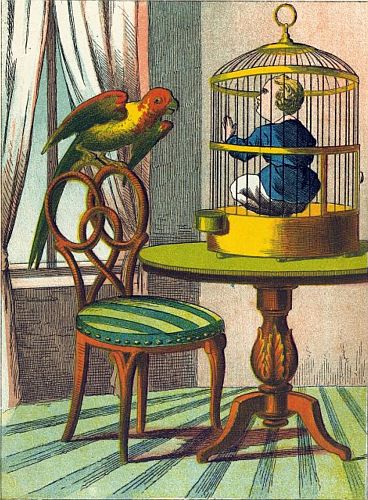
Some dogs had frightened him, and he had run—run like a hare, in fact, and then sat down upon his form to think. The dogs had not stood upon ceremony, so he didn't choose to stand upon forms, but sat down comfortably.
He twitched his ears, and scratched his wig, and thought.
"And I won't put up with it—there," said he, aloud. "It's only cowardice putting up with things. I'll get some fellows to help me, and we'll hunt the dogs."
At that moment he heard a sound.
"Wow! bow, wow, wow!" barked some dog, a little way off.
The Hare jumped up again, and flew off as quick as his legs would carry him. After running some distance, he sat down again, but this time he found neither forms nor ceremonies.
But he found something that was better. A gun and a sportsman's bag were lying near, and he eyed them.
"I wonder if that gun would go off if I touched it!" he said to himself.
He walked round and round it, and then cautiously pawed it. No: it didn't seem to have the least idea of going off.
Then he lifted it up, and grew quite bold.
"I wonder if I could shoot anything?" thought he.
He aimed at a bird, and brought it down.
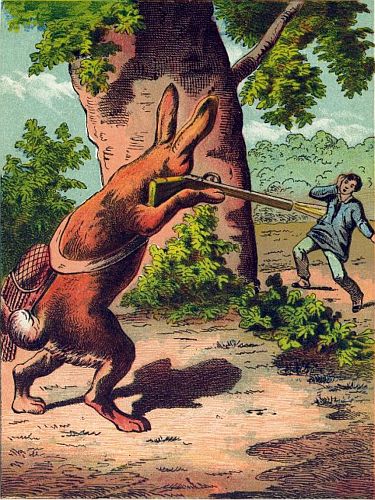
"Bravo, bravo, bravo!" cried he. "I'll take this gun, and then if anybody tries to torment or to catch me, I'll—I'll kill them."
He hung the bag round his waist, and put the gun on his shoulder, then walked off to his home. On the way, a boy ran at him, and cried "Bo!" but he just pointed the gun, and the boy ran away.
The Hare lived all by himself, but he was very comfortable. Nobody could bother him, and he would have been quite content only for the men and the dogs.
Every day he practised with his gun till he got to be very skilful.
So he sang, as he sat one day polishing up his gun.
As he was busily at work, he heard a noise, and cocked his ear. Tramp, tramp, tramp, came along some one—a man. It was a poacher, who said to himself he was going to catch a fine fat Hare. The man cast an eye round, but the Hare hid, and watched.
Then the man stole nearer, and peeped round a tree.
"Aha!" said the Hare. "You want to catch me, and eat me, don't you? But I am going to catch you, and boil you for my supper."
The man only laughed, for it was preposterous the idea of a Hare catching a man, instead of a man catching a hare.
And the Hare just cocked his gun, put it to his shoulder, and fired. Then he did kill the poacher, and took him home, and stewed him with mushrooms for supper.

"If you were me, you would not talk like that," said the Invalid, in a poor sick weak voice. "I'd eat dry bread, and never ask to be petted at all if I were strong, like you."
The Strong Man laughed, as if he didn't believe the Invalid.
"I have to work hard all day, and nobody seems to care a bit whether I'm tired or not," said he. "But if you only have a finger ache, everybody is running about trying to find something to do you good. And they come and read to you, and bring you flowers, and—and—"
"You just take my place for a day or two, and see how you'd like it," said the Invalid.
"Um—well, I shouldn't like to be ill, you know," said the Strong Man. "I shouldn't like to lie in bed, nor have the doctor coming to see me, because he'd give me nasty stuff to take."
"I'll be your doctor," said the Invalid. "But you must lie in bed. Come, take my place."
The Strong Man was ashamed to refuse.
"Well, now you are comfortable, I suppose," said the Invalid, tucking him in. "You must try to doze a little."
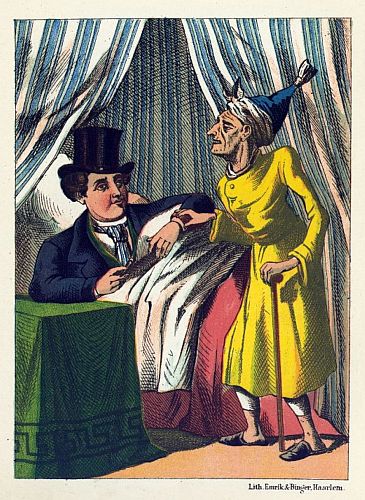
"But I'm not sleepy," said the Strong Man.
"You'll soon be tired, and go to sleep," said the Invalid. "I'm going away, but shall be back in an hour or two."
When he went away, the place seemed dreadfully dull. Not a sound was to be heard except the barking of a dog in a farm-yard near, and the cluck cluck of some hens.
"Dear, dear," said the Strong Man, "this is very tiresome."
Presently an old lady looked in.
"Poor dear, poor dear," said she, "I will read a nice book to you."
So she sat down and read out of a book. But the Strong Man didn't care about the book, and he thought the old lady stupid.
Then she went away, and by-and-by, a kind old gentleman came in with some chicken, and a glass of wine, and some beautiful white bread.
"Here," said he, "Take this, it will do you good."
But the Strong Man didn't feel hungry, and he was tired and cross by this time, so he wouldn't have any of it. Then some more people came in, and talked to him, and told him the Invalid had gone to see the reapers, and tried to be kind to him. Then at last everybody stole away on tiptoe, and left him alone.
Then the Invalid came back. But by that time the Strong Man had had quite enough of being shut up in a sick room, so he jumped up, and ran to the door.
"I see you are not much to be envied," said he to the Invalid. "I don't think I shall ever envy anybody again so long as I have health and strength."
"We shall have such a game," said he to his paper Tails.
"We mostly do," squeaked the Tails.
There were eighteen of them, and they were all very frisky.
The Kite first winked one eye, then the other, then winked both together.
I'm afraid he was rather a vulgar sort of a Kite, but he was very jolly. His eyes were inclined to be goggly, yellow round the outside, with red in the middle. He was not a particularly good-looking Kite—in fact, he was really ugly—but he was very funny, and loved a joke.
The string suddenly wakened up out of a nap, hearing talk going on, "Eh, what's that?" said he.
"Don't know," said the Tails.
The Kite laughed again, and shook his round ears, and showed all his teeth in one wide grin. "We'll have a game this afternoon," said he, once more.
"Oh," said the String. "We mostly do."
The Kite stuck up his pointed chin, and shook his red paper beard. "I mean a different sort of game to what you mean," said he. "You mean, we have a game when young Walter takes us out. But I don't mean that."
"Then what do you mean?" said the String, who didn't care about guessing.
"When he takes us out, we have to go where he likes, and fly when he chooses us to fly," said the Kite. "Now I mean, we'll fly young Walter."
"Eh?" said the String.
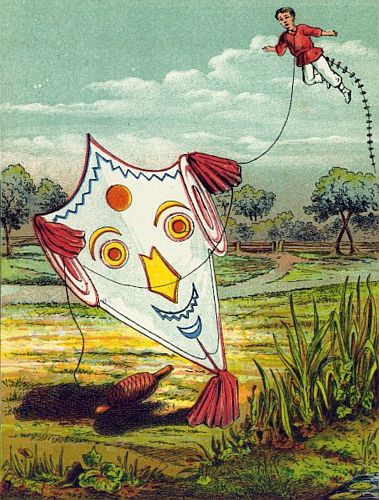
The String was rather sleepy-headed, and didn't take in new ideas very quickly. He was so astonished now that he unrolled himself several yards, and wriggled about round the Kite, to look at him, as if he must be out of his mind.
"Eh?" said all the Tails, after a flutter of surprise. But they thought it was a joke, and that the Kite only meant to be funny. The Kite straightened himself, and looked very important. "When I say a thing, I mean it," said he, in a dignified manner.
"Well, but—" said one Tail, timidly.
"Well, but what?" snapped the Kite. "You don't know what you're talking about. I say we'll fly—"
At that minute up came Walter. He took hold of the Kite, and was winding up the String, when the Kite said—
"Master Walter, let's fly you to day!"
Walter stared and laughed.
"You couldn't," said he. "You're only made of paper."
"Let us try," said the Kite.
"I mustn't go far, then," said Walter, "because my mother would wonder where I was."
So the String was tied about Walter, and up he flew. It was very jolly, and he flew here and there like a bird. The Kite and the String were delighted, and the Tails kept on a chatter, chatter, chatter, like eighteen little magpies all in a row. But the Kite found it hard work after a time. He had to mind the string, and watch lest Walter should tumble down, and keep on doing this and doing that, instead of pleasantly fluttering about. He got cross and grumpy at last. "I think the old way's the best," said he. "Next time I'll go up. Old ways are best, after all."


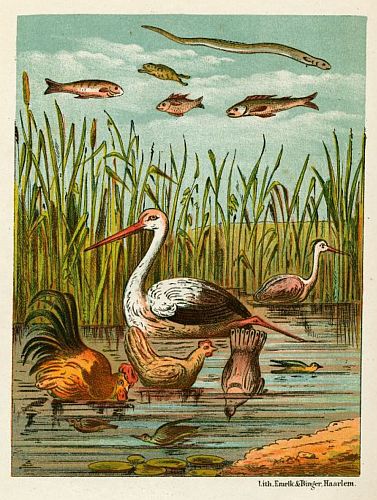
"My dear," cried the Lion, "such a piece of news!"
"Oh, indeed?" said the Lioness. "Have you found some travellers to eat?"
"Better than that," said the Lion, all a-glow, rubbing his paws.
"Oh, in-deed," said the Lioness, smiling. "Then it must be very good indeed."
"Yes," said the Lion. "Just guess, my love."
"How can I guess? I never was good at guessing. Besides, you could tell me quicker than I could guess," said the Lion's wife.
"How clever you are," said the Lion, putting his tawny head on one side, and looking admiringly at his queen. "Perhaps telling is the quickest way after all. Well—" Then he stopped, as if to tantalize.
"Well—what? How tiresome you are," said the Lioness.
"They have brought a cageful of humans to the town, and all the Beasts and all the Birds are going to see the show."
"What!" cried the Lioness, so astonished that she could hardly believe her ears.
The Lion skipped right round the parlour three times, snapping his claws like castanets. "Yes," said he, gleefully, "they used to lock us up, and let people pay to see us, and call us Wild Beasts, and Carnivora, and all sorts of ugly names. But times are changed. I wonder how they'll like it? We'll take our little beasts of children to see the show."
"You shouldn't call the little ducks Beasts," said the Lioness. "I wonder you don't call them a parcel of Cubs."
"Well, they are Beasts and Cubs, ain't they?" said the Lion.
"Well, never mind, I won't have them spoken of like that," said his wife. "When will you take me and the darling pets to see this wonderful show?"
"Come now," said the Lion, jingling his money in the purse he carried in the end of his tail.
"Oh, I'm not dressed," said the Lioness.
"You never are," said the Lion.
"That's true," said his wife. "Well, here! children! come along and see the Tame Humans."
The young cubs came rolling in, all tumbling over one another, like jolly little brutes as they were, and set up a wild roar of delight at hearing they were going out for the day. When they got half way, the Lion suddenly stopped and considered.
"I think," said he, "as we are going to change places with the humans, we ought to have all the fine things they used to have, so we'll buy some clothes."
"All right, my dear," said the Lioness.
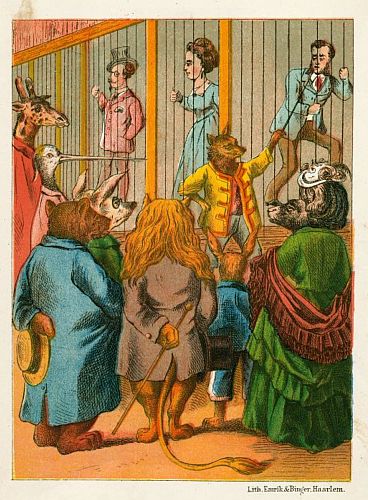
So they went into a shop, which they found belonged to a very civil elephant. They were quickly fitted out with nice suits, and then trotted contentedly on. A large crowd of beasts and birds was going the same way, and at the door it was hard to get in. The greatest excitement prevailed—which means, you know, that people—animals, I mean—were laughing and talking, and wondering, and squeezing, and pushing, and treading on one another's toes, and saying "Where are you shoving to?" and "There's plenty of room," and "Don't be disagreeable," and "Don't lose your temper, pray," and asking questions, and all that kind of thing. The Lion and his wife were afraid to take in the children, so left them outside with an old Cow, who was herself too frightened to venture, and too fat to squeeze through the throng. Inside, the animals were all staring their hardest. The humans in the cages didn't at all relish being shown, and were very cross. A Wolf with a long stick was telling about all their ways, and poking them up to make them roar. One young man in a blue coat howled with rage, until a good-natured old Rhinoceros, with a red shawl, threw him a bun. He was so ungrateful as to kick it out of his cage, which offended the old Rhinoceros, as you may imagine.
"Times are changed, ain't they?" said a jolly old Bear to the Lion, chuckling.
"Quite time too," answered the Lion.
The Ostrich craned his long neck, and stared as hard as he could, as did all the animals. The Lioness was very well pleased, but she hurried out to see after her children, while the Lion stayed to have a good look. In fact, there never had been such a sight seen in Beastland before, and I don't suppose there ever will be such a one again.

"That's what I say," grumbled the Elm.
"To be sure," cried the Oak, in a deep, deep, deep voice—you would have fancied it came out of his boots. But I forgot: of course Oaks don't wear boots—but that does not signify.
The Aspen and the Sycamore sighed, and shook their leaves, and looked wise.
The Chestnut and the Beech whispered to one another, and waved their boughs indignantly.
"Yes," said the Poplar, a tall, straight, stiff tree, with a squeaky voice, "I do think it's a shame the Wood-cutters should be allowed to come here and cut us up whenever they choose. The Government, or the Parish, or the Local Authorities, or—or—somebody, ought to hinder them."
"Everybody encourages them to do it," said the Box Tree, angrily. The Box Tree was rather fond of fighting, and that's how he came by his name.
"I know what we ought to do," said the Birch, "Whip them."
"Chop them up," cried the Plane Tree, who was fond of carpentry.
The trees all fluttered their leaves. They were rather frightened at the ideas of the Birch and Plane.
"Well," growled the Oak. But he couldn't think of anything to say, so was obliged to stop.
The Ivy had not said a word, but listened to everything. Now she lifted up her head, and spoke—so softly that it seemed as if the summer wind was rustling through her leaves.
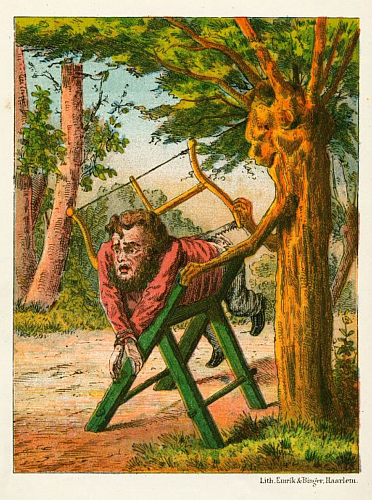
"I think," said the gentle Ivy—and though she spoke so sweetly, her voice could be heard by every tree—"I think when there are so many branches to spare, and when it is an improvement to the trees to be lopped and pruned a little bit, it is foolish to object. And when we know the poor wood-cutters make their living by cutting wood in the forest, and when poor children are often shivering in the winter for want of fire, it is selfish to grumble about a few fagots of wood."
There was a deep stillness. Not a word did any tree speak, till the Elm said, with a bit of a sneer, "Ivy does not know what she is talking about."
"She means well," said the Cedar, "but she does talk nonsense." "So she does," murmured some other trees.
Ivy hung her head, and heard with grief and displeasure that the very next wood-cutter who came through the forest should be chopped up, as an example. In the afternoon, Hans came along, singing gaily to himself. He looked about, and noticed some branches that might be cut off without spoiling the trees, for he loved the trees, and would not have hurt them for the world. But as he laid down his saw on his wooden horse, it was snatched by the Birch with its long arms, and he felt himself whipped up.
"Oh, oh, oh," cried Hans.
"Ho, ho, ho," cried the trees, maliciously.
Ivy covered herself with her own leaves, for she could not bear to see so sad a sight, and she cried. So Hans was cut up, and his poor children had nobody to earn any money to buy them food, for their mother was dead. And the wood-cutters were afraid to come near the forest, lest they should be served like Hans. And what happened? Why, there was nobody to prune the trees, and they grew so thick that their branches all got entangled and twisted, and they smothered one another.
Obvious punctuation errors repaired.
The remaining corrections made are indicated by dotted lines under the corrections. Scroll the mouse over the word and the original text will appear.
End of Project Gutenberg's The World Turned Upside Down, by E. C. Clayton
*** END OF THIS PROJECT GUTENBERG EBOOK THE WORLD TURNED UPSIDE DOWN ***
***** This file should be named 37414-h.htm or 37414-h.zip *****
This and all associated files of various formats will be found in:
https://www.gutenberg.org/3/7/4/1/37414/
Produced by Emmy, Marilynda Fraser-Cunliffe and the Online
Distributed Proofreading Team at https://www.pgdp.net (This
file was produced from images generously made available
by the University of Florida Digital Collections.)
Updated editions will replace the previous one--the old editions
will be renamed.
Creating the works from public domain print editions means that no
one owns a United States copyright in these works, so the Foundation
(and you!) can copy and distribute it in the United States without
permission and without paying copyright royalties. Special rules,
set forth in the General Terms of Use part of this license, apply to
copying and distributing Project Gutenberg-tm electronic works to
protect the PROJECT GUTENBERG-tm concept and trademark. Project
Gutenberg is a registered trademark, and may not be used if you
charge for the eBooks, unless you receive specific permission. If you
do not charge anything for copies of this eBook, complying with the
rules is very easy. You may use this eBook for nearly any purpose
such as creation of derivative works, reports, performances and
research. They may be modified and printed and given away--you may do
practically ANYTHING with public domain eBooks. Redistribution is
subject to the trademark license, especially commercial
redistribution.
*** START: FULL LICENSE ***
THE FULL PROJECT GUTENBERG LICENSE
PLEASE READ THIS BEFORE YOU DISTRIBUTE OR USE THIS WORK
To protect the Project Gutenberg-tm mission of promoting the free
distribution of electronic works, by using or distributing this work
(or any other work associated in any way with the phrase "Project
Gutenberg"), you agree to comply with all the terms of the Full Project
Gutenberg-tm License (available with this file or online at
https://gutenberg.org/license).
Section 1. General Terms of Use and Redistributing Project Gutenberg-tm
electronic works
1.A. By reading or using any part of this Project Gutenberg-tm
electronic work, you indicate that you have read, understand, agree to
and accept all the terms of this license and intellectual property
(trademark/copyright) agreement. If you do not agree to abide by all
the terms of this agreement, you must cease using and return or destroy
all copies of Project Gutenberg-tm electronic works in your possession.
If you paid a fee for obtaining a copy of or access to a Project
Gutenberg-tm electronic work and you do not agree to be bound by the
terms of this agreement, you may obtain a refund from the person or
entity to whom you paid the fee as set forth in paragraph 1.E.8.
1.B. "Project Gutenberg" is a registered trademark. It may only be
used on or associated in any way with an electronic work by people who
agree to be bound by the terms of this agreement. There are a few
things that you can do with most Project Gutenberg-tm electronic works
even without complying with the full terms of this agreement. See
paragraph 1.C below. There are a lot of things you can do with Project
Gutenberg-tm electronic works if you follow the terms of this agreement
and help preserve free future access to Project Gutenberg-tm electronic
works. See paragraph 1.E below.
1.C. The Project Gutenberg Literary Archive Foundation ("the Foundation"
or PGLAF), owns a compilation copyright in the collection of Project
Gutenberg-tm electronic works. Nearly all the individual works in the
collection are in the public domain in the United States. If an
individual work is in the public domain in the United States and you are
located in the United States, we do not claim a right to prevent you from
copying, distributing, performing, displaying or creating derivative
works based on the work as long as all references to Project Gutenberg
are removed. Of course, we hope that you will support the Project
Gutenberg-tm mission of promoting free access to electronic works by
freely sharing Project Gutenberg-tm works in compliance with the terms of
this agreement for keeping the Project Gutenberg-tm name associated with
the work. You can easily comply with the terms of this agreement by
keeping this work in the same format with its attached full Project
Gutenberg-tm License when you share it without charge with others.
1.D. The copyright laws of the place where you are located also govern
what you can do with this work. Copyright laws in most countries are in
a constant state of change. If you are outside the United States, check
the laws of your country in addition to the terms of this agreement
before downloading, copying, displaying, performing, distributing or
creating derivative works based on this work or any other Project
Gutenberg-tm work. The Foundation makes no representations concerning
the copyright status of any work in any country outside the United
States.
1.E. Unless you have removed all references to Project Gutenberg:
1.E.1. The following sentence, with active links to, or other immediate
access to, the full Project Gutenberg-tm License must appear prominently
whenever any copy of a Project Gutenberg-tm work (any work on which the
phrase "Project Gutenberg" appears, or with which the phrase "Project
Gutenberg" is associated) is accessed, displayed, performed, viewed,
copied or distributed:
This eBook is for the use of anyone anywhere at no cost and with
almost no restrictions whatsoever. You may copy it, give it away or
re-use it under the terms of the Project Gutenberg License included
with this eBook or online at www.gutenberg.org
1.E.2. If an individual Project Gutenberg-tm electronic work is derived
from the public domain (does not contain a notice indicating that it is
posted with permission of the copyright holder), the work can be copied
and distributed to anyone in the United States without paying any fees
or charges. If you are redistributing or providing access to a work
with the phrase "Project Gutenberg" associated with or appearing on the
work, you must comply either with the requirements of paragraphs 1.E.1
through 1.E.7 or obtain permission for the use of the work and the
Project Gutenberg-tm trademark as set forth in paragraphs 1.E.8 or
1.E.9.
1.E.3. If an individual Project Gutenberg-tm electronic work is posted
with the permission of the copyright holder, your use and distribution
must comply with both paragraphs 1.E.1 through 1.E.7 and any additional
terms imposed by the copyright holder. Additional terms will be linked
to the Project Gutenberg-tm License for all works posted with the
permission of the copyright holder found at the beginning of this work.
1.E.4. Do not unlink or detach or remove the full Project Gutenberg-tm
License terms from this work, or any files containing a part of this
work or any other work associated with Project Gutenberg-tm.
1.E.5. Do not copy, display, perform, distribute or redistribute this
electronic work, or any part of this electronic work, without
prominently displaying the sentence set forth in paragraph 1.E.1 with
active links or immediate access to the full terms of the Project
Gutenberg-tm License.
1.E.6. You may convert to and distribute this work in any binary,
compressed, marked up, nonproprietary or proprietary form, including any
word processing or hypertext form. However, if you provide access to or
distribute copies of a Project Gutenberg-tm work in a format other than
"Plain Vanilla ASCII" or other format used in the official version
posted on the official Project Gutenberg-tm web site (www.gutenberg.org),
you must, at no additional cost, fee or expense to the user, provide a
copy, a means of exporting a copy, or a means of obtaining a copy upon
request, of the work in its original "Plain Vanilla ASCII" or other
form. Any alternate format must include the full Project Gutenberg-tm
License as specified in paragraph 1.E.1.
1.E.7. Do not charge a fee for access to, viewing, displaying,
performing, copying or distributing any Project Gutenberg-tm works
unless you comply with paragraph 1.E.8 or 1.E.9.
1.E.8. You may charge a reasonable fee for copies of or providing
access to or distributing Project Gutenberg-tm electronic works provided
that
- You pay a royalty fee of 20% of the gross profits you derive from
the use of Project Gutenberg-tm works calculated using the method
you already use to calculate your applicable taxes. The fee is
owed to the owner of the Project Gutenberg-tm trademark, but he
has agreed to donate royalties under this paragraph to the
Project Gutenberg Literary Archive Foundation. Royalty payments
must be paid within 60 days following each date on which you
prepare (or are legally required to prepare) your periodic tax
returns. Royalty payments should be clearly marked as such and
sent to the Project Gutenberg Literary Archive Foundation at the
address specified in Section 4, "Information about donations to
the Project Gutenberg Literary Archive Foundation."
- You provide a full refund of any money paid by a user who notifies
you in writing (or by e-mail) within 30 days of receipt that s/he
does not agree to the terms of the full Project Gutenberg-tm
License. You must require such a user to return or
destroy all copies of the works possessed in a physical medium
and discontinue all use of and all access to other copies of
Project Gutenberg-tm works.
- You provide, in accordance with paragraph 1.F.3, a full refund of any
money paid for a work or a replacement copy, if a defect in the
electronic work is discovered and reported to you within 90 days
of receipt of the work.
- You comply with all other terms of this agreement for free
distribution of Project Gutenberg-tm works.
1.E.9. If you wish to charge a fee or distribute a Project Gutenberg-tm
electronic work or group of works on different terms than are set
forth in this agreement, you must obtain permission in writing from
both the Project Gutenberg Literary Archive Foundation and Michael
Hart, the owner of the Project Gutenberg-tm trademark. Contact the
Foundation as set forth in Section 3 below.
1.F.
1.F.1. Project Gutenberg volunteers and employees expend considerable
effort to identify, do copyright research on, transcribe and proofread
public domain works in creating the Project Gutenberg-tm
collection. Despite these efforts, Project Gutenberg-tm electronic
works, and the medium on which they may be stored, may contain
"Defects," such as, but not limited to, incomplete, inaccurate or
corrupt data, transcription errors, a copyright or other intellectual
property infringement, a defective or damaged disk or other medium, a
computer virus, or computer codes that damage or cannot be read by
your equipment.
1.F.2. LIMITED WARRANTY, DISCLAIMER OF DAMAGES - Except for the "Right
of Replacement or Refund" described in paragraph 1.F.3, the Project
Gutenberg Literary Archive Foundation, the owner of the Project
Gutenberg-tm trademark, and any other party distributing a Project
Gutenberg-tm electronic work under this agreement, disclaim all
liability to you for damages, costs and expenses, including legal
fees. YOU AGREE THAT YOU HAVE NO REMEDIES FOR NEGLIGENCE, STRICT
LIABILITY, BREACH OF WARRANTY OR BREACH OF CONTRACT EXCEPT THOSE
PROVIDED IN PARAGRAPH 1.F.3. YOU AGREE THAT THE FOUNDATION, THE
TRADEMARK OWNER, AND ANY DISTRIBUTOR UNDER THIS AGREEMENT WILL NOT BE
LIABLE TO YOU FOR ACTUAL, DIRECT, INDIRECT, CONSEQUENTIAL, PUNITIVE OR
INCIDENTAL DAMAGES EVEN IF YOU GIVE NOTICE OF THE POSSIBILITY OF SUCH
DAMAGE.
1.F.3. LIMITED RIGHT OF REPLACEMENT OR REFUND - If you discover a
defect in this electronic work within 90 days of receiving it, you can
receive a refund of the money (if any) you paid for it by sending a
written explanation to the person you received the work from. If you
received the work on a physical medium, you must return the medium with
your written explanation. The person or entity that provided you with
the defective work may elect to provide a replacement copy in lieu of a
refund. If you received the work electronically, the person or entity
providing it to you may choose to give you a second opportunity to
receive the work electronically in lieu of a refund. If the second copy
is also defective, you may demand a refund in writing without further
opportunities to fix the problem.
1.F.4. Except for the limited right of replacement or refund set forth
in paragraph 1.F.3, this work is provided to you 'AS-IS' WITH NO OTHER
WARRANTIES OF ANY KIND, EXPRESS OR IMPLIED, INCLUDING BUT NOT LIMITED TO
WARRANTIES OF MERCHANTIBILITY OR FITNESS FOR ANY PURPOSE.
1.F.5. Some states do not allow disclaimers of certain implied
warranties or the exclusion or limitation of certain types of damages.
If any disclaimer or limitation set forth in this agreement violates the
law of the state applicable to this agreement, the agreement shall be
interpreted to make the maximum disclaimer or limitation permitted by
the applicable state law. The invalidity or unenforceability of any
provision of this agreement shall not void the remaining provisions.
1.F.6. INDEMNITY - You agree to indemnify and hold the Foundation, the
trademark owner, any agent or employee of the Foundation, anyone
providing copies of Project Gutenberg-tm electronic works in accordance
with this agreement, and any volunteers associated with the production,
promotion and distribution of Project Gutenberg-tm electronic works,
harmless from all liability, costs and expenses, including legal fees,
that arise directly or indirectly from any of the following which you do
or cause to occur: (a) distribution of this or any Project Gutenberg-tm
work, (b) alteration, modification, or additions or deletions to any
Project Gutenberg-tm work, and (c) any Defect you cause.
Section 2. Information about the Mission of Project Gutenberg-tm
Project Gutenberg-tm is synonymous with the free distribution of
electronic works in formats readable by the widest variety of computers
including obsolete, old, middle-aged and new computers. It exists
because of the efforts of hundreds of volunteers and donations from
people in all walks of life.
Volunteers and financial support to provide volunteers with the
assistance they need are critical to reaching Project Gutenberg-tm's
goals and ensuring that the Project Gutenberg-tm collection will
remain freely available for generations to come. In 2001, the Project
Gutenberg Literary Archive Foundation was created to provide a secure
and permanent future for Project Gutenberg-tm and future generations.
To learn more about the Project Gutenberg Literary Archive Foundation
and how your efforts and donations can help, see Sections 3 and 4
and the Foundation web page at https://www.pglaf.org.
Section 3. Information about the Project Gutenberg Literary Archive
Foundation
The Project Gutenberg Literary Archive Foundation is a non profit
501(c)(3) educational corporation organized under the laws of the
state of Mississippi and granted tax exempt status by the Internal
Revenue Service. The Foundation's EIN or federal tax identification
number is 64-6221541. Its 501(c)(3) letter is posted at
https://pglaf.org/fundraising. Contributions to the Project Gutenberg
Literary Archive Foundation are tax deductible to the full extent
permitted by U.S. federal laws and your state's laws.
The Foundation's principal office is located at 4557 Melan Dr. S.
Fairbanks, AK, 99712., but its volunteers and employees are scattered
throughout numerous locations. Its business office is located at
809 North 1500 West, Salt Lake City, UT 84116, (801) 596-1887, email
business@pglaf.org. Email contact links and up to date contact
information can be found at the Foundation's web site and official
page at https://pglaf.org
For additional contact information:
Dr. Gregory B. Newby
Chief Executive and Director
gbnewby@pglaf.org
Section 4. Information about Donations to the Project Gutenberg
Literary Archive Foundation
Project Gutenberg-tm depends upon and cannot survive without wide
spread public support and donations to carry out its mission of
increasing the number of public domain and licensed works that can be
freely distributed in machine readable form accessible by the widest
array of equipment including outdated equipment. Many small donations
($1 to $5,000) are particularly important to maintaining tax exempt
status with the IRS.
The Foundation is committed to complying with the laws regulating
charities and charitable donations in all 50 states of the United
States. Compliance requirements are not uniform and it takes a
considerable effort, much paperwork and many fees to meet and keep up
with these requirements. We do not solicit donations in locations
where we have not received written confirmation of compliance. To
SEND DONATIONS or determine the status of compliance for any
particular state visit https://pglaf.org
While we cannot and do not solicit contributions from states where we
have not met the solicitation requirements, we know of no prohibition
against accepting unsolicited donations from donors in such states who
approach us with offers to donate.
International donations are gratefully accepted, but we cannot make
any statements concerning tax treatment of donations received from
outside the United States. U.S. laws alone swamp our small staff.
Please check the Project Gutenberg Web pages for current donation
methods and addresses. Donations are accepted in a number of other
ways including including checks, online payments and credit card
donations. To donate, please visit: https://pglaf.org/donate
Section 5. General Information About Project Gutenberg-tm electronic
works.
Professor Michael S. Hart was the originator of the Project Gutenberg-tm
concept of a library of electronic works that could be freely shared
with anyone. For thirty years, he produced and distributed Project
Gutenberg-tm eBooks with only a loose network of volunteer support.
Project Gutenberg-tm eBooks are often created from several printed
editions, all of which are confirmed as Public Domain in the U.S.
unless a copyright notice is included. Thus, we do not necessarily
keep eBooks in compliance with any particular paper edition.
Most people start at our Web site which has the main PG search facility:
https://www.gutenberg.org
This Web site includes information about Project Gutenberg-tm,
including how to make donations to the Project Gutenberg Literary
Archive Foundation, how to help produce our new eBooks, and how to
subscribe to our email newsletter to hear about new eBooks.